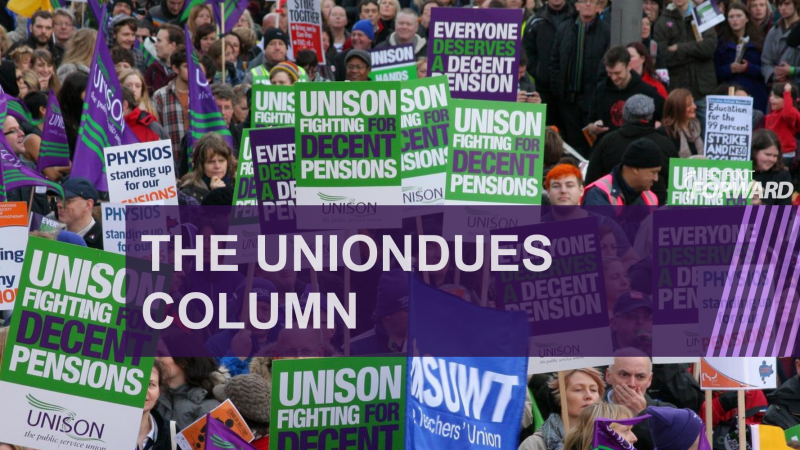The ACAS chair speaks to Simon Sapper on bringing workers and bosses together.

Simon Sapper is a trade unionist and host of the UnionDues podcast.
The latest UnionDues podcast drops here at 12 noon on 22 June. Our special guest is the chair of Conciliation and Arbitration service (ACAS), Clare Chapman.
As the first ACAS chair from a business background in over 20 years, having held senior or board positions in companies like BT, Tesco and G4S, what can we expect? In a wide-ranging discussion, we get some important pointers.
Front and centre of her approach is the idea that social partnership, the bedrock of ACAS’s way of working “is not a theory, it’s a way of life.”
There is a sense of both pride and responsibility here. “People using and providing the service are passionate about the role and potential of ACAS,” Clare enthuses, pointing out that “ACAS is a dominant player [in arbitration] and that means we have responsibilities”.
“I do sense that at this historical moment there is a role for ACAS to bring parties together in search of a way that says ‘let’s use the world’s best thinking to find a way through’” disputes, she tells the pod.
The organisation has just delivered an important review of the use of Fire-and-Rehire, which predates the current pandemic-era fascination with the practice. Clare is clear: “It’s completely unacceptable to use threats of fire and rehire as a negotiating tactic,” and decries those in companies who believe it is a cost-free quick-fix.
Pointing to the latest Social Attitudes survey, Clare is optimistic that when it comes to building trust between employers and workers, “I think we’re in a different place to even 18 months ago.” It differs somewhat from the lived experience of many workers having been reporting to their unions across sectors.
But if the views of the social partners do not always coincide, ACAS’s new four year plan – taking the organisation through to 2025 – provides a constructive framework within which to research, debate, and engage. “Forging a consensus on the future of work” is one key goal, as is “Embracing difference, increasing inclusion, creating fairness.” The government-funded body is keen to extend its reach.
“It’s clear that the challenges around sustainability, fairness [and] employee voice – these are the issues of the moment,” says Clare. Brendan Barber, Ed Sweeney, or Rita Donaghy, her three immediate and union-rooted predecessors, would probably not disagree.
Also in this episode, Glasgow University Professor of Work and Employment Mel Simms dissects employment dynamics in the hospitality sector and wonders if maybe, just maybe, the tide is turning in favour of better pay and conditions in her #thought4theweek.
LFF’s own Josiah Mortimer previews this week’s #RadicalRoundUp looking at the People Assembly’s latest protest, the UCU dispute with the University of Liverpool, Unite making progress on employment rights at Amazon and Labour shaping the debate on flexible working.
If you missed it, there was a UnionDues special last week on the GMB/Uber deal, with the GMB’s Martin Smith. You can access that here. All episodes available at https://uniondues.podbean.com/
Left Foot Forward doesn't have the backing of big business or billionaires. We rely on the kind and generous support of ordinary people like you.
You can support hard-hitting journalism that holds the right to account, provides a forum for debate among progressives, and covers the stories the rest of the media ignore. Donate today.



